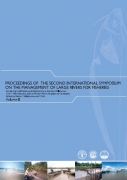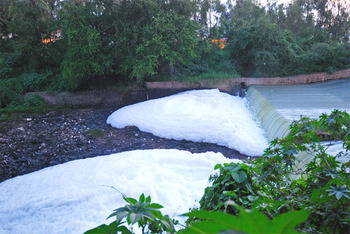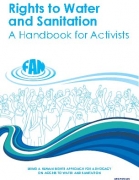/topics/surface-water
Surface Water
Latest status of the storage of important reservoirs in the country - CWC - PIB Release
Posted on 05 Feb, 2011 12:17 PMOf these, as many as 36 reservoirs are having significant hydro-power benefits with installed capacities of more than 60MW each. The combined live storage in these 81 reservoirs at the beginning of monsoon, i.e. June 1, 2010 was 14% of their designed capacity and stood at 60% of designed capacity as on January 27, 2011. The present storage is 137% of last year’s storage and 145% of last 10 years average storage during the same period. Out of these 81 reservoirs there are presently 15 reservoirs where this year’s storage is less than 80 % of the average of previous 10 years and in remaining 66 reservoirs the storage is more than 80% of the average of previous 10 years.
Wetlands (Conservation and Management) Rules 2010 - Welcome, but a lost opportunity - Press release by SANDRP
Posted on 04 Feb, 2011 10:33 AMOn the occasion of the World Wetlands Day 2011, while we welcome the notification of Wetland (Conservation and Management) rules 2010 by the Union Ministry of Env
Proceedings of the second international symposium on the management of large rivers for fisheries by FAO and Mekong River Commission
Posted on 03 Feb, 2011 07:55 PM The second international symposium on the management of large rivers for fisheries was held by the Food and Agriculture Organisation of the United Nations (FAO) and Mekong River Commission on 11 - 14 February 2003 in Phnom Penh, Kingdom of Cambodia. It had three primary objectives: (a) To provide a forum to review and synthesise the latest information on large rivers; (b) To raise the political, public and scientific awareness of the importance of river systems, the living aquatic resources they support and the people that depend on them; and (c) To contribute to better management, conservation and restoration of the living aquatic resources of large rivers.
The second international symposium on the management of large rivers for fisheries was held by the Food and Agriculture Organisation of the United Nations (FAO) and Mekong River Commission on 11 - 14 February 2003 in Phnom Penh, Kingdom of Cambodia. It had three primary objectives: (a) To provide a forum to review and synthesise the latest information on large rivers; (b) To raise the political, public and scientific awareness of the importance of river systems, the living aquatic resources they support and the people that depend on them; and (c) To contribute to better management, conservation and restoration of the living aquatic resources of large rivers.
The symposium was organised in six sessions:
Session 1: Status of rivers
Session 2: Value of river fisheries
Session 3: Fisheries ecology and conservation
Session 4: Management of river fisheries
Session 5: Statistics and information
Session 6: Synthesis
It came up with the following recommendations for action -
- Improve the valuation of living river resources in order to contribute to equitable and sustainable management of fishery resources and properly place the fishery in the context of the other uses of rivers.
- Direct greater effort to better understanding the social and economic aspects of fisheries to support policy and management priorities; livelihood approaches will be a valuable tool.
- Communicate and engage with environment and water resources managers within the context of multi-use of water in order to accurately assess impacts and to sustain the benefits of river fisheries in an equitable manner.
- Develop processes that facilitate the users and beneficiaries of the fishery resource to assume greater control of its management.
- Establish appropriate mechanisms at national and basin level to enable negotiation for the needs of communities dependent upon the living aquatic resources. In particular further regulations need to be elaborated to protect general ecosystem function and provide for environmental flows.
- Use instruments such as the freshwater eco-regions approach, the Ramsar Convention and the guidelines for water allocation suggested by the World Commission on Dams, to enhance planning for conservation and sustainable use of river habitats.
- Incorporate ecological flow requirements of river-floodplain systems into development plans and impact assessments that affect river flows, taking into account the seasonality of the system and the environmental cues needed by the fish for migration and reproduction.
- Rehabilitate degraded ecosystems wherever possible. Prioritize schemes that ensure connectivity and protection of critical habitats.
Run for Bellandur Lake, 6th February 2011, Bangalore
Posted on 03 Feb, 2011 03:26 PM Organizers: Group of Environmental and Social Activists
Organizers: Group of Environmental and Social Activists
Venue: Bangalore
Description:
This run is a demand from citizens for government action and it is also intended to spread awareness of the situation.
This event is for all of us in Bangalore, our children, our health and well being. We can get back our wonderful lakes, not to mention valuable drinking water for the future.
Conjunctive use of surface water and ground water - Lecture delivered by Dr. R. Jagadiswara Rao at National Water Academy, Pune
Posted on 03 Feb, 2011 12:09 PM
Dr. R. Jagadishwara Rao
Former Professor of Geology
Sri Venkateswara University
Tirupati, AP 517502
MSW graduates required for data collection on watershed
Posted on 02 Feb, 2011 03:25 PMForwarded to the portal by: L.C.Nagaraj
We have taken up evaluation of 65 water sheds in Northern districts of Karnataka. These water sheds are spread across Bagalkot,Raichur, Koppala, Bellary and Davanagere districts.
Questions on the ‘Value’ of a river for Indians - A review of the book "Economics of River Flows" by Dr. Bharat Jhunjhunwala
Posted on 01 Feb, 2011 05:38 PMIn his last book, 'Economics of hydropower' Dr. jhunjhunwala comes to a conclusion that we have neglected some very important costs of hydropower, while overestimating its benefit.
Right to water and sanitation - A handbook for activists by Freshwater Action Network (FAN) Global
Posted on 31 Jan, 2011 10:11 PM With tihs, they can improve water and sanitation service regulation and provision at international, national and local levels. Directed primarily at community groups, human rights NGOs, rights-based development practitioners and aid workers, this handbook aims to strengthen human rights-based advocacy by providing innovative and practical suggestions that activists and organisations can use in their work. It also acts as a resource guide for finding further information.
With tihs, they can improve water and sanitation service regulation and provision at international, national and local levels. Directed primarily at community groups, human rights NGOs, rights-based development practitioners and aid workers, this handbook aims to strengthen human rights-based advocacy by providing innovative and practical suggestions that activists and organisations can use in their work. It also acts as a resource guide for finding further information.
Water and sanitation are essential for living a healthy life with dignity. However, around a billion people across the world lack access to a safe and sufficient water supply to cover their basic needs. Over 2.5 billion people lack access to adequate sanitation and nearly 1.2 billion face the indignity of open defecation every day.
The Millennium Development Goal (MDG) target to halve the proportion of people without sustainable access to safe drinking water and basic sanitation by 2015 is seriously off track, with sanitation severely lagging behind. For example, estimates suggest that at current rates of progress, sub-Saharan Africa will miss the MDG water target by about 25 years, while the sanitation target may not be reached until well into the 22nd century.
Training course on Hydrological Investigation for Conservation and Management of Lakes, National Institute of Hydrology, 1st to 3rd March 2011, Roorkee
Posted on 31 Jan, 2011 10:59 AMOrganizer: National Institute of Hydrology
Venue: National Institute of Hydrology, Roorkee
Topics:
- Basics of lake hydrology
- Evaporation and water balance of lakes
- Water quality and eutrophication
Ancient water and soil conservation ecosystems of Sri Lanka – Some aspects - Paper presented at the National Seminar on Water and Culture (2007)
Posted on 31 Jan, 2011 02:57 AMThis paper presents the ancient water and soil conservation eco-systems of Sri Lanka, based on ancient texts and their modern interpretations, and highlights the use of these water systems in ancient Sri Lanka and their present condition.





